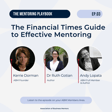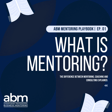
Contracting with Mentoring Clients
Welcome to today's episode of the ABM Podcast, where we delve into the critical aspects of business mentoring. I'm your host, Kerrie Dorman, founder of the Association of Business Mentors. Today, we have a special guest, Brenda Etchells, who serves as the North Chair for ABM and is an experienced business mentor & ILM7 graduate.
In this episode, we’ll be discussing the importance of contracting with mentoring clients—a foundational element for a successful mentoring relationship. Brenda brings her wealth of experience and insights to this discussion, helping us understand why a well-structured contract can set the stage for effective mentoring.
So, whether you’re a seasoned mentor or just starting out, stay tuned as we explore the best practices and key considerations for contracting with your mentoring clients.
Key Learnings:
- Clear Expectations: Establishing a contract helps set clear expectations for both mentors and mentees, defining the scope and objectives of the mentoring relationship.
- Confidentiality: A contract ensures confidentiality, building trust and providing a safe space for open and honest communication.
- Roles and Responsibilities: Outlining specific roles and responsibilities prevents misunderstandings and ensures both parties are aware of their commitments.
- Goals and Milestones: Setting specific goals and milestones in the contract helps in tracking progress and achieving desired outcomes.
- Duration and Frequency: Agreeing on the duration and frequency of meetings upfront ensures consistency and commitment from both sides.
- Conflict Resolution: Including a conflict resolution clause in the contract provides a framework for addressing any issues that may arise during the mentoring process.
By the end of this episode, you’ll have a comprehensive understanding of why contracting is essential and how it can significantly enhance your mentoring practice.





